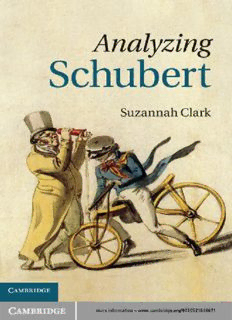Table Of ContentThis page intentionally left blank
Analyzing Schubert
When Schubert’s contemporary reviewers first heard his modula-
tions, they famously claimed that they were excessive, odd, and
unplanned. This book argues that these claims have haunted the
analysisofSchubert’sharmony eversince, outliningwhy Schubert’s
musicoccupiesacuriouslymarginalpositioninthehistoryofmusic
theory.AnalyzingSchuberttraceshowcritics,analysts,andhistorians
fromtheearlynineteenthcenturytothepresentdayhavepreserved
cherishednarrativesofwandering,alienation,memory,andtranceby
emphasizingthemysticalratherthanthelogicalqualityofthecom-
poser’sharmony.Thisstudyproposesanewmethodforanalyzingthe
harmonyofSchubert’sworks.Ratherthanpursuinganapproachthat
casts Schubert’s famous harmonic moves as digressions from the
norms of canonical theoretical paradigms, Suzannah Clark explores
howtheharmonicfingerprintsinSchubert’ssongsandinstrumental
sonataformschallengepedigreedhabitsofthoughtaboutwhatcon-
stitutesatheoryoftonalandformalorder.
suzannah clark isGardnerCowlesAssociateProfessorofMusic
at Harvard University. In addition to her work on Schubert, her
researchinterestsrangefrom medievalFrench motets tothehistory
of music theory from Rameau to Schenker. She is the co-editor of
CitationandAuthorityinMedievalandRenaissanceMusicalCulture:
Learning from the Learned, with Elizabeth Eva Leach, and Music
Theory and Natural Order from the Renaissance to the Early
TwentiethCentury,withAlexanderRehding.
Analyzing Schubert
suzannah clark
CAMBRIDGE UNIVERSITY PRESS
Cambridge,NewYork,Melbourne,Madrid,CapeTown,
Singapore,Sa˜oPaulo,Delhi,Tokyo,MexicoCity
CambridgeUniversityPress
TheEdinburghBuilding,CambridgeCB28RU,UK
PublishedintheUnitedStatesofAmericabyCambridgeUniversityPress,NewYork
www.cambridge.org
Informationonthistitle:www.cambridge.org/9780521848671
©SuzannahClark2011
Thispublicationisincopyright.Subjecttostatutoryexception
andtotheprovisionsofrelevantcollectivelicensingagreements,
noreproductionofanypartmaytakeplacewithoutthewritten
permissionofCambridgeUniversityPress.
Firstpublished2011
PrintedintheUnitedKingdomattheUniversityPress,Cambridge
AcataloguerecordforthispublicationisavailablefromtheBritishLibrary
LibraryofCongressCataloginginPublicationdata
Clark,Suzannah,1969–
AnalyzingSchubert/SuzannahClark.
p. cm.
Includesbibliographicalreferencesandindex.
ISBN978-0-521-84867-1
1. Schubert,Franz,1797–1828–Criticismandinterpretation. I. Title.
ML410.S3C43 2011
780.92–dc22
2011007625
ISBN978-0-521-84867-1Hardback
CambridgeUniversityPresshasnoresponsibilityforthepersistenceor
accuracyofURLsforexternalorthird-partyinternetwebsitesreferredto
inthispublication,anddoesnotguaranteethatanycontentonsuch
websitesis,orwillremain,accurateorappropriate.
To my sisters: Sandra and Sally
Contents
Acknowledgements [pageviii]
Introduction [1]
1 SingingSchubert’spraises:thevoiceofVoglinSchubert’s
earlyhistory [6]
2 “Awordwilloftendoit”:harmonicadventureinSchubert’s
songs [56]
3 Musictheoryandthemusicologicalimagination:
perceptionsofSchubert’ssonataform [146]
4 Analyzingmusictheory:aSchubertiancritique [204]
Epilogue [268]
Bibliography [272]
Index [284]
vii
Acknowledgements
AsSirGeorgeGrovewasnearingthecompletionofhisarticleonSchubert
for the dictionary that would bear his name, he wrote to a friend that he
fearedhewoulddeeplymissSchubert,whohadbeenhis“companion”for
solong.Incompletingthisbook,IhavesomesympathyforGrove’ssenti-
ment. Yet writing these acknowledgements brings to the fore all the col-
leagues and friends that I have been lucky enough to have as real
companionsduringthewritingofthisbook.
The ideas for this volume first took shape while I was at Oxford. My
thanksgo,asalways,toEmanueleSeniciandIamsogladthatourtimesat
Oxfordcoincided.Inparticular,Ioweanenormousdebtofgratitudetomy
colleague at Merton College, Edward Olleson, whose formidable musical
knowledgesharpenedmyearstonumerousniftyharmonicpassagesfrom
Haydn to Brahms. I am gratefulto Susan Wollenberg,who invited me to
teachajointcourseonSchubert’sinstrumentalmusic,whereIplayedout
someoftheideasinthisbookandreceivedvaluableresponsesfromSusan
andthestudents.Ialsogainedmuchjoyovertheyearsfromthetriumphs
ofeachofmytutorialstudentsinMertonandUniv.IamgratefultoEric
Clarkeforsomeimportantconversationsaboutlifeandmusicanalysis,as
wellasforanimateddebatesoveranalyticalquagmireswithJonathanCross
andLawrenceDreyfus.
I consider myself extremely fortunate to have had Simon Jones as my
colleagueinmatterspertainingtotheMertonCollegeChoir.Iamgrateful
tothechefatMerton,MikeWente,andtothekitchenstaffandbutlersfor
servingsuchsuperbmealswithsuchincredibleimagination.Icannotbegin
to count (though Oxford keeps impeccable records on such matters) the
number of meals I ate with colleagues over the years atMerton, but I am
especially grateful to the Warden and Fellows for bringing a sense of
humor, wit, friendship, and deep intellectual exchange to them all. For
morningcoffeesandconversations,IrecallwithfondnessRichardMcCabe,
Vijay Joshi (who also kindly gave me a huge collection of scores), the
college librarian Julia Walworth, and the emeritus Fellows Michael
Dunnill and Roger Highfield. In fact, coffee with them was such a staple
viii
Description:When Schubert's contemporary reviewers first heard his modulations, they famously claimed that they were excessive, odd and unplanned. This book argues that these claims have haunted the analysis of Schubert's harmony ever since, outlining why Schubert's music occupies a curiously marginal position

